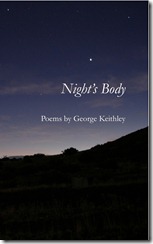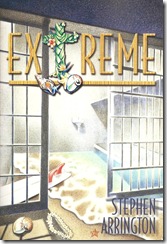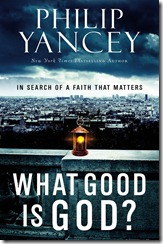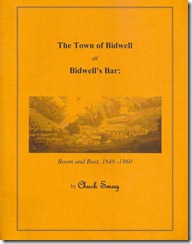
Maybe because it's "the cruelest month," as T.S. Eliot would have it, April is National Poetry Month. In a time that mixes "memory and desire" we need the poet to call our attention afresh to the little corners of our lives. And so, just in time, we have "Night's Body" ($19 in paperback from WordTech Communications) by George Keithley.
He'll be reading his poems at Lyon Books in Chico on Tuesday, April 19 at 7:00 p.m.
The retired Chico State University professor illuminates the night we all must traverse. In five sections ("At Four in the Morning," "Winter Nocturnes," "Women at Night," "In the Night of Unknowing," and "Summer Night") Keithley awakens memory and desire in the context of shadows. The "Tree House," "A tree of stars / where our children stir and dream // they are flying from limb to limb / among the shining creatures taking shape / the moment the mind makes them out-- / The Hunter, two Bears, the Princess, the Swan, / dance on the dark floor of heaven. . . ."
But the heavenly visions are anchored to the earth. In "The Driver," "Before us Search and Rescue had planted flares. / Unsteady stars, they flamed up, hissed, flickered / over the slick creekside, revealing tape / that sealed the 'discovery site'--bold yellow / like the body bag laid out upon the bank. . . ."
And what will we do to the animals? "Who can inhabit the unholy sleep / of the soul once they wander / silently away? Who'll bark, howl, / bray, croak, whirr, whinny, all / together raise their joyful noise?" ("When They Leave" won the Pushcart prize.) The poet continues: "Droves of animals who mate and thrive / and swarm before our eyes only / to disappear when we dream / because they are too innocent / to survive."
"Winter Night": "Silence / thrives in the black night and we know / at the heart of this clarity / is sorrow." Then "The Dance": "Memory spares us nothing touched by love-- / You wept without a sound while my fingers brushed / your blouse--apple blossoms--then we walked down / among the last trees, their shifting shadows, / into the light to join the others."



